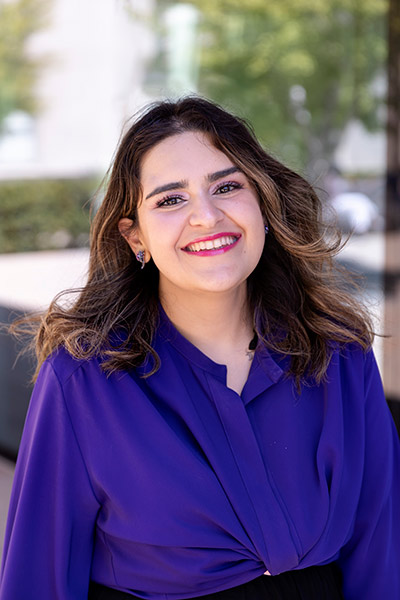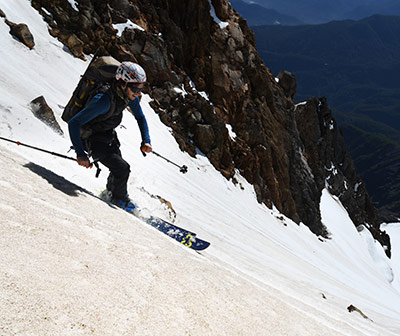By Gwyneth K. Shaw

LL.M. student Ceren Aytekin’s path to the law included a number of twists and turns: She was a precocious computer programmer who considered and discarded genetic engineering before enjoying public international law enough in school that she spent a summer at Oxford University to strengthen her understanding.
As she describes it, the first day of a “randomly chosen” intellectual property course at Oxford lit a spark that quickly became a burning passion. Aytekin went back to Turkey, finished her degree, and joined a firm specializing in IP law. She got involved with the International Trademark Association, and now chairs one of its European subcommittees.
Still, Aytekin wanted to spend time away from Turkey, and zeroed in on California when she started looking for a Master of Laws (LL.M.) program. She gravitated toward Berkeley Law’s long reputation as a leader in IP law, and says so far, the program has more than validated her choice of school.
“I love everything I’m taking, even the most challenging ones,” she says. “And by taking these classes, I realized that I don’t want to be in the tech industry — I actually want to be in the entertainment industry. With this newfound clarity, I decided to join the board of Berkeley Society of Entertainment and Sports Law, and to do a Student-Initiated Legal Services Project, Arts and Innovation Representation, supervised by the California Lawyers for the Arts.”
Fortunately, Berkeley Law and its location is a great place for that, too: The school has an extensive alumni network in the industry. So Aytekin, who quoted Eminem’s “Lose Yourself” in her application, is eagerly making connections, on campus and off.
“I go to too many conferences — that’s what my friends say,” she says, laughing. “But I think I’m in the best place in the U.S. to be for conferences and events and networking events that are relevant to my interests.
“I’m glad that I ended up here. Berkeley is just the right fit.”
From Afghanistan to Iceland
Aytekin is just one of the 280 students in this year’s LL.M. cohort. They represent 49 countries, and while a significant number come from Asia, others hail from Iceland, Macao, Lithuania, Nepal, Moldova, Kuwait, Vietnam, Ukraine, and Romania.
These students bring a rich variety of experiences to their advanced legal studies: One served as a judge in Afghanistan before seeking asylum in the U.S. after the Taliban returned to power, for example, while another represented a client in the first intellectual property case heard by the Constitution Bench in India.

Carlos Maximiliano (Max) Fischer came to Berkeley Law from Chile, where he worked in litigation and was an avid outdoorsman, including ski mountaineering and traversing the Andes on foot three times. After running into many fences and other property barriers restricting his routes, he was inspired to research the idea of the “right to roam,” which became his undergraduate thesis.
Amid Chile’s second constitutional assembly in 2023, which aims to replace the 1980 constitution drafted under dictator Augusto Pinochet, Fischer says he “realized nobody was taking this topic forward as public initiatives to be included in the constitution. So we launched a campaign with an alliance of mountain clubs and research centers to include a minimalist norm on access to nature in the new constitution.”
Ultimately, the drive failed, but he hopes it will one day be successful in becoming statutory law. In the meantime, Fischer’s desire to study law at a deeper level led him to Berkeley Law, where the temperate climate and easy access to nature appealed to his lifestyle.
Ironically, he’s often so wrapped up in the Berkeley Law environment — not just his course work but the vibrant stream of events hosted at the school — that he hasn’t spent as much time outdoors as he’d expected.
In recent weeks, Fischer heard from renowned activist and Professor Angela Davis, at one of the first events sponsored by the school’s new Criminal Law & Justice Center, and Pennsylvania Supreme Court Justice David Wecht.
“There’s always an amazing group of people coming in and out, and they’re at the forefront of major discussions,” Fischer says. “It’s very invigorating.”
Fischer has also been impressed by the faculty he’s learning from, such as Professor Tejas N. Narechania, from whom he’s taking Regulated Digital Industries: Telecommunications Law & Policy for a Modern Era, and the J.D. students he’s learning alongside.
“It’s a very different way of looking at the law,” he says. “Chile is a civil law jurisdiction. It’s all coded-based and about reading doctrine.”
A holistic experience
Anya Grossmann, senior director of admissions and recruiting in the school’s Advanced Degree Programs Office, says Aytekin and Fischer typify the program’s strong students.
“Max and Ceren embody what is so special about our LL.M. students: they bring their passion and unique perspectives to the Berkeley Law community,” she says. “Both clearly have a thirst for knowledge that brought them where they were in their careers before they joined us here at Berkeley Law. We can’t wait to see where their degree takes them after they graduate.”
Aytekin also points to a strong social component. A survey of the cohort found the students’ favorite hobby is traveling, and she says that even in the first few weeks of the school year, students have explored the Bay Area and beyond, from the Japanese Tea Garden in Golden Gate Park to Yosemite and Napa Valley. There are WhatsApp groups for planning trips, working out, going to concerts, or just hanging out, she says.
“Everyone has found someone they share interests with,” she says. “We’re a happy community.”
And Aytekin notes something else that drew her to Berkeley Law that she’s enjoying: The opportunity to take a fascinating array of classes alongside J.D. students. At several other schools she considered, many of the courses she was most interested in were only for J.D. students. At Berkeley, she says, there’s no divide between the groups.
“I spoke with a lot of alumni from last year’s cohort, and all of them told me that, and I see the difference. I was able to take every single class I wanted,” she says. “That’s one of the reasons I chose this school. Plus, I wanted to be in California, and I wanted to do the best IP program in the country — and that was clearly Berkeley Law.”